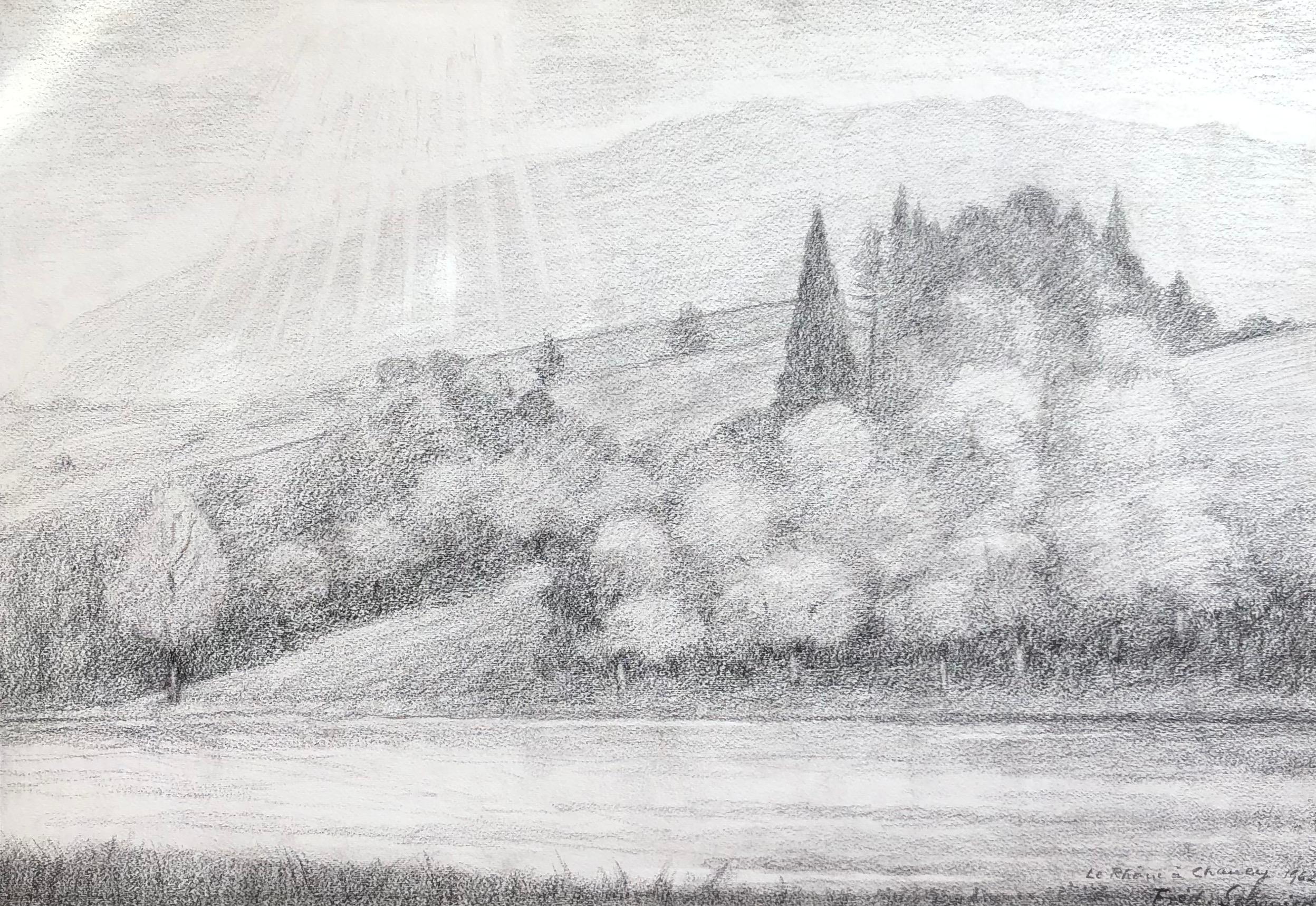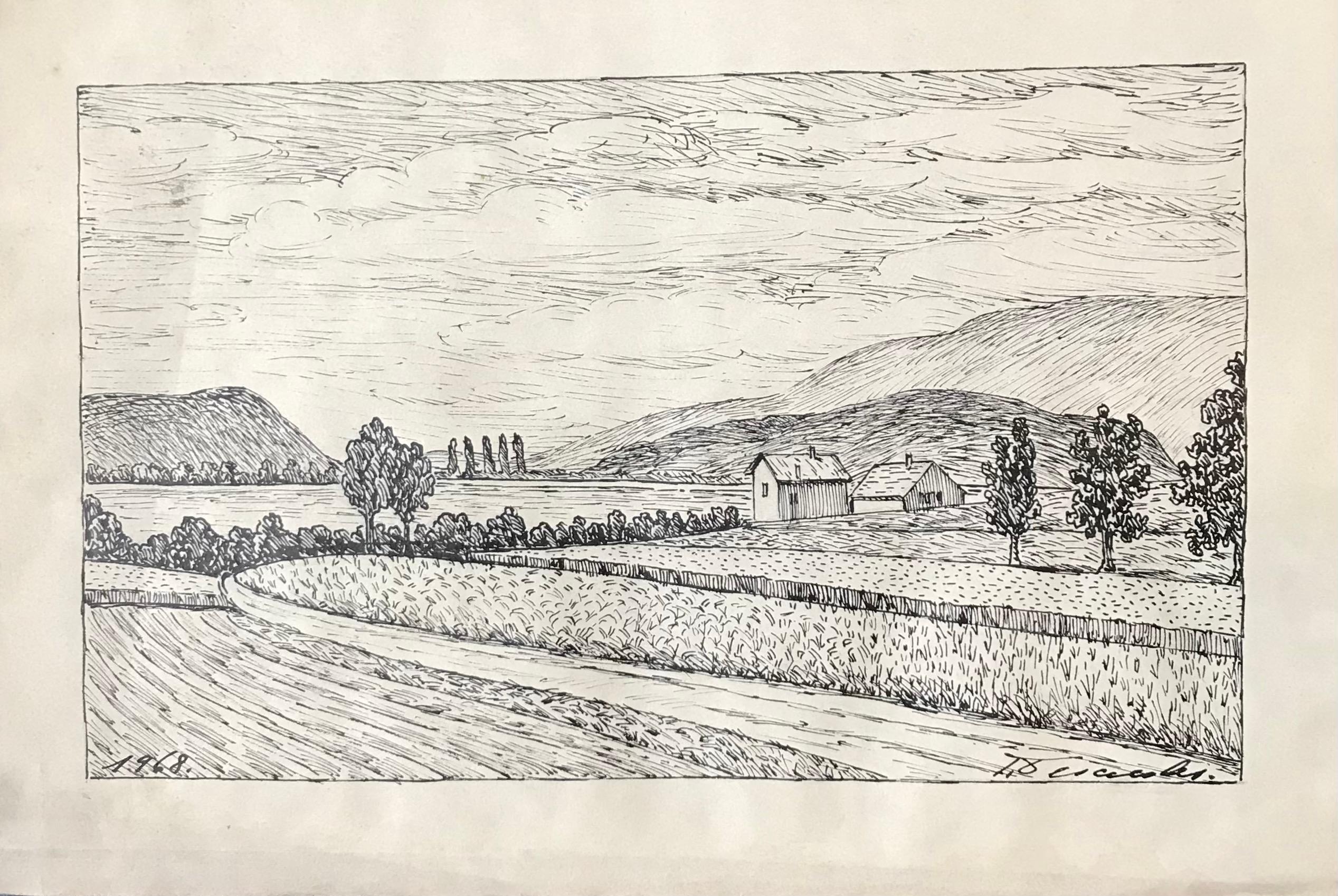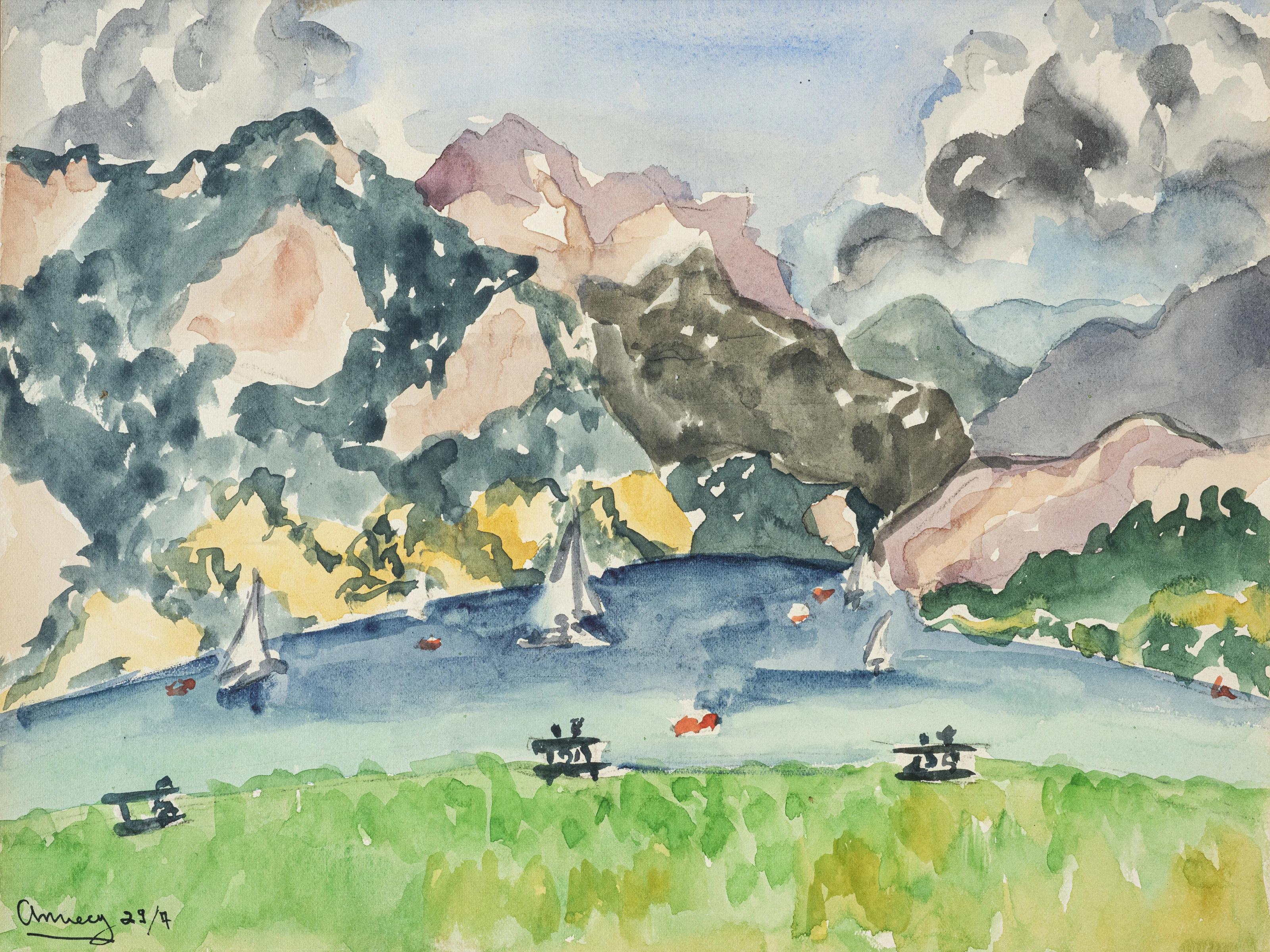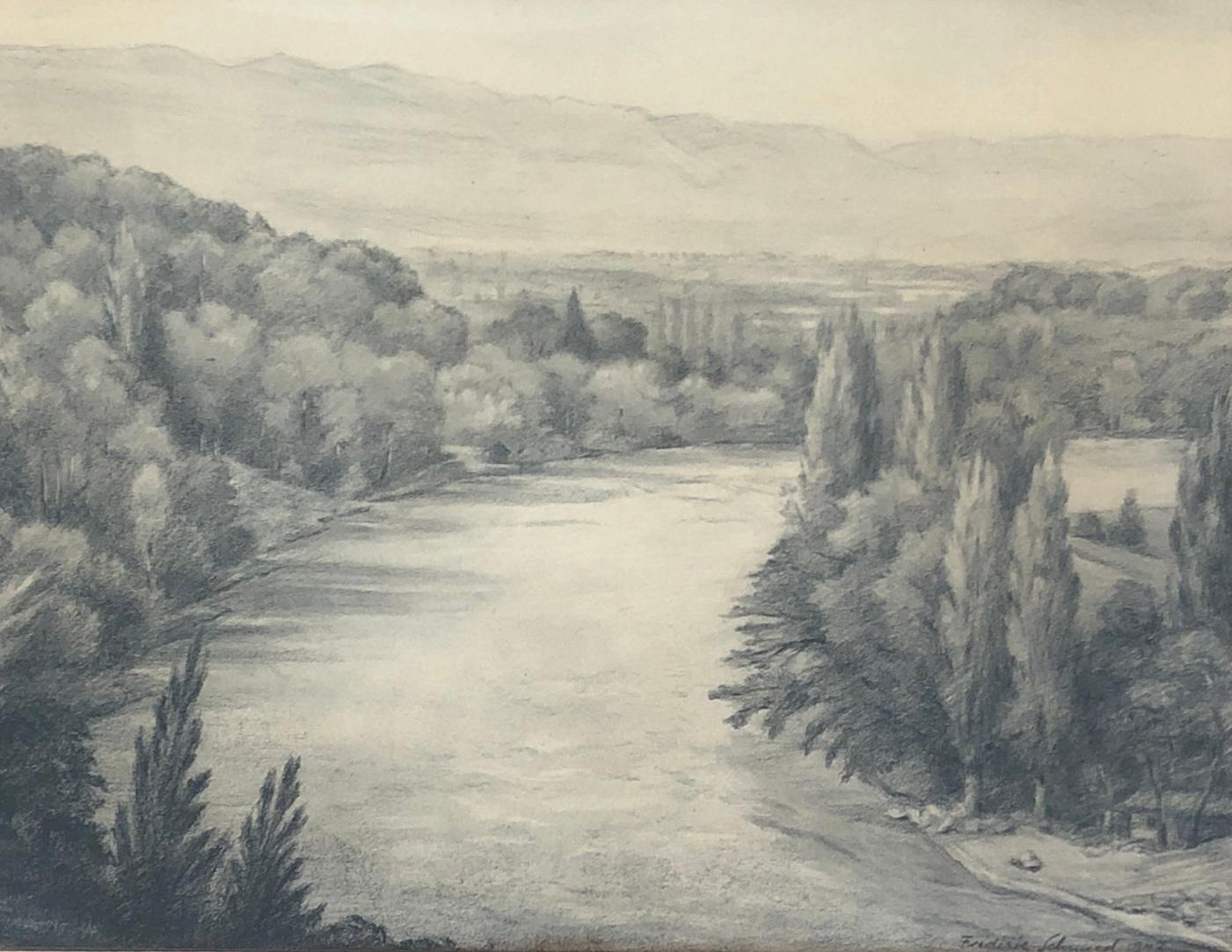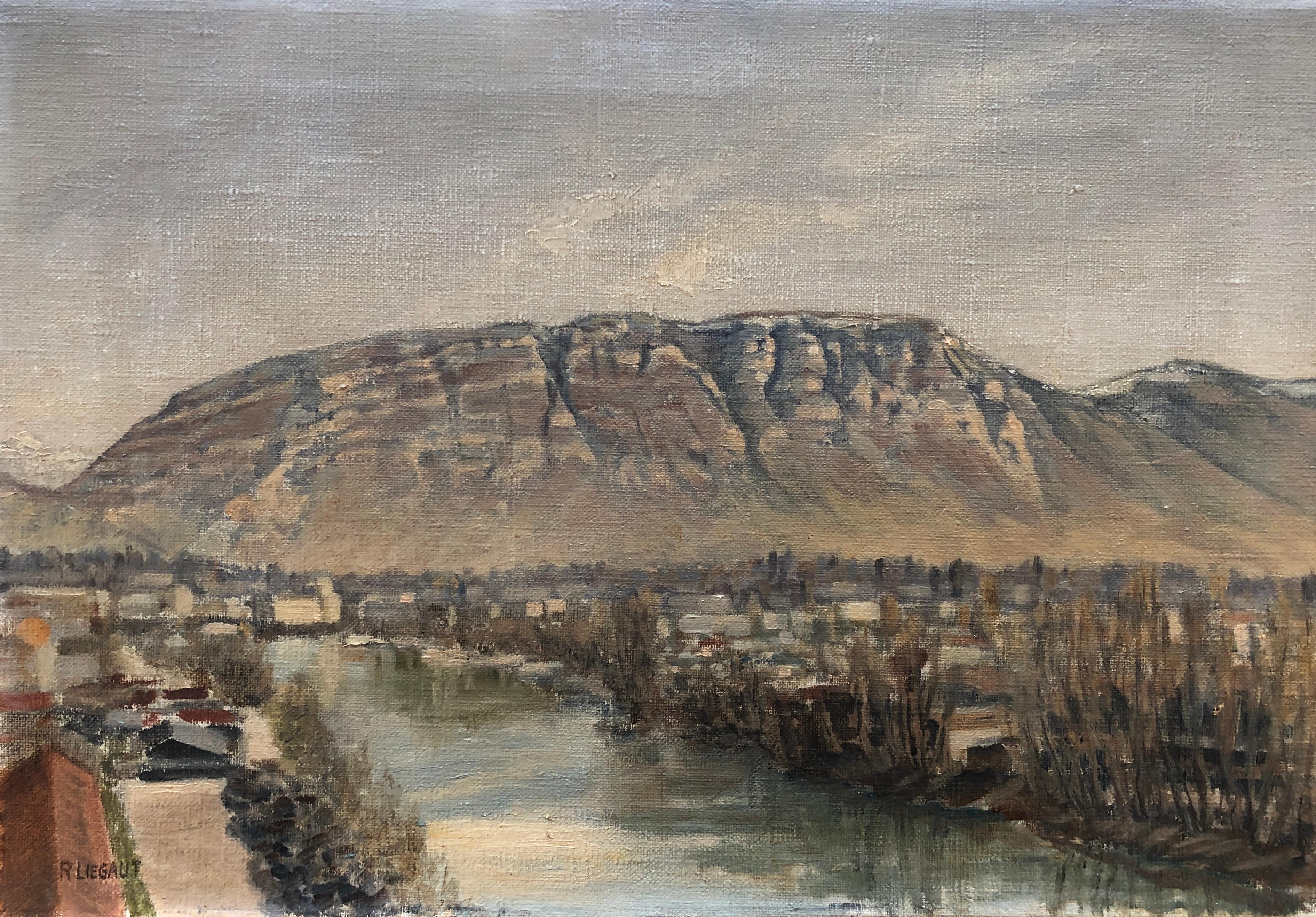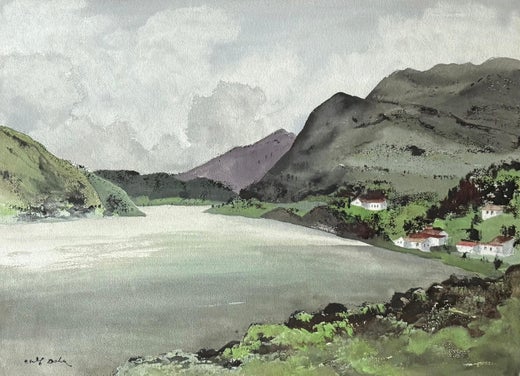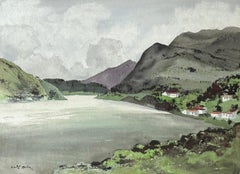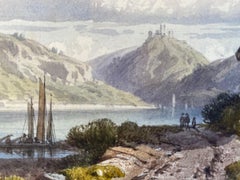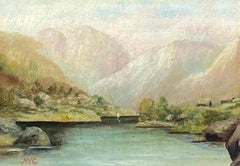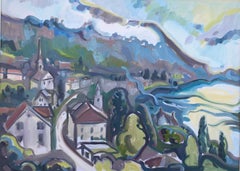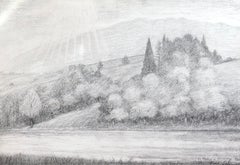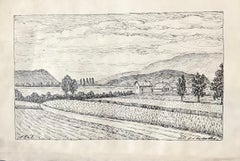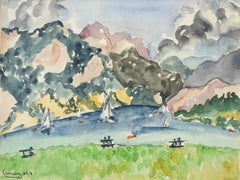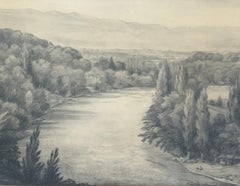Items Similar to “Aiguebelette, Savoie”
Want more images or videos?
Request additional images or videos from the seller
1 of 9
Adolf Arthur Dehn“Aiguebelette, Savoie”1925
1925
$2,400
$3,20025% Off
£1,805.30
£2,407.0725% Off
€2,080.92
€2,774.5525% Off
CA$3,380.67
CA$4,507.5525% Off
A$3,709.40
A$4,945.8625% Off
CHF 1,941.33
CHF 2,588.4325% Off
MX$45,650.10
MX$60,866.7925% Off
NOK 24,457.78
NOK 32,610.3825% Off
SEK 22,908.36
SEK 30,544.4825% Off
DKK 15,537.97
DKK 20,717.2925% Off
About the Item
Original early modernist india ink drawing with brushwork by the well known American artist, Adolf Arthur Dehn. Signed by the artist, titled and dated 1925 lower right. Dehn spent his early career traveling and working in Europe during the three year time period 1922 to 1925 when this drawing was done in France. The Chateau d’Auguebelette build in the fourteen century as a fort sits high on the mountain range to the left. Condition is very good. Light toning of paper consistent with age. Under glass, not examined out of frame. The artwork is housed in a antique style silver leaf contemporary frame 16.25 by 22 inches.
Adolf Dehn, painter, printmaker, author, illustrator and teacher, was born Adolph Arthur Dehn in Waterville, Minnesota on November 22, 1895. He was valedictorian of his graduating class at Waterville High School and attended the Minneapolis School of Art between 1914 and 1917. Dehn studied for a year at the Art Students League in New York beginning in 1919. While in New York he met Boardman Robinson who introduced him to the master printer, George Miller. The first exhibition of Dehn's lithographs was held at the Weyhe Gallery in New York City in 1921 and the Weyhe Gallery mounted his first solo exhibition in 1923.
Throughout is life Dehn was a frequent visitor to Europe, staying for various periods of time. Upon his return from a three-year stay in Europe in 1925, he changed the spelling of his first name to Adolf.
In 1934, Dehn established the Adolf Dehn Print Club and was one of the founder-member artists of Associated American Artists in New York. He was selected by Prints magazine as one of the ten best printmakers in the United States in 1936 and the following year he worked in the graphic arts division of the Federal Art Project. He taught summers at Stephens College in Columbia, Missouri (1938) and the Colorado Springs Fine Arts Center (1940-1942).
For his lithographs, Dehn worked with the finest printers including Meister Schulz in Berlin, Edmond Desjobert in Paris, and George Miller, Grant Arnold, and Lawrence Barrett in the United States.
Dehn was awarded two Guggenheim fellowships, the first in 1939 and the second in 1951. He also was awarded a Yaddo Foundation grant for the summer of 1955. In 1961 he was elected a full Academician in the National Academy of Design and in 1965 he was elected to membership in the National Institute of Arts and Letters. Dehn’s works are in the collections of the Museum of Fine Arts Boston, Brooklyn Museum, Butler Institute of American Art, Art Institute of Chicago, Library of Congress, Metropolitan Museum of Art, Museum of Modern Art, Philadelphia Museum of Art, Smithsonian American Art Museum, Springfield Art Museum, and the Whitney Museum of American Art.
Adolf Dehn died on May 19, 1968.
Aiguebelette-le-Lac is a commune and village in the Savoie department in the Auvergne-Rhône-Alpes region in south-eastern France. In 2016, it had a population of 249 people. It is named after and lies near the southeastern shore of Lac d'Aiguebelette, one of the largest natural lakes of France. Le Port is a small port on the lake, with a beach. The commune contains the Château d'Aiguebelette, a medieval structure which is in a ruinous state, while the main church in the area, dedicated to Saint Andrew, was restored in 1854.
- Creator:Adolf Arthur Dehn (1895-1968, American)
- Creation Year:1925
- Dimensions:Height: 12 in (30.48 cm)Width: 18 in (45.72 cm)Depth: 1 in (2.54 cm)
- Medium:
- Movement & Style:
- Period:
- Condition:
- Gallery Location:Southampton, NY
- Reference Number:1stDibs: LU1417450722
Adolf Arthur Dehn
Adolf Dehn, printmaker, watercolorist, and illustrator, was born in Waterville, Minnesota, in 1895. In 1914 he began studying at the Minneapolis School of Art, and in 1917, the year his first published drawing appeared in the progressive magazine, The Masses, he received a scholarship to study at the Art Students League in New York. There he worked with Kenneth Hayes Miller and was introduced to lithography by Boardman Robinson. While in New York, Dehn threw himself into liberal politics. Declaring himself a conscientious objector in 1918, he was forced to spend four months in a Spartanburg, South Carolina, boot camp for refusing to serve in the armed forces and eight months as a volunteer instructor teaching painting and drawing at a hospital for war victims in Asheville, North Carolina. Dehn spent the years 1920 to 1929 in art-related travel in Europe, primarily in Vienna and in Paris, where he made lithographs at the Atelier Desjobert. Throughout this time, Dehn exhibited his work at the Weyhe Gallery in New York and contributed drawings both to magazines abroad and to the radical journal The Masses. Upon his return to New York in 1929, he became a leading figure in printmaking circles, exhibiting his prints to considerable critical acclaim. In 1937, Dehn had worked exclusively in black and white until 1937—halfway through his career—when he began to work in watercolor. During his summer visits to Minnesota, he created a large body of regional watercolors depicting the lakes and farms of his home state. Lithography and watercolor remained his two primary media, and his subjects ranged from social satire to naturalistic landscapes. He authored the treatise, Water Color Painting, in 1945 and two other instructional books on lithography and watercolor in 1950 and 1955. From 1938 to 1939 he taught at Stephens College in Columbia, Missouri, and during the summers of 1940-1942 he taught at the Colorado Springs Fine Arts Center. In 1939 and 1951 Dehn received Guggenheim Fellowships, and 1961 he was elected Full Academician to the National Academy of Design. Dehn exhibited throughout his career, and his works are in the permanent collections of the Metropolitan Museum of Art, the Museum of Modern Art, the Art Institute of Chicago, the Museum of Fine Arts in Boston, and the British Museum, among others. Adolf Dehn died in New York in 1968.
About the Seller
5.0
Platinum Seller
Premium sellers with a 4.7+ rating and 24-hour response times
Established in 1977
1stDibs seller since 2013
546 sales on 1stDibs
Typical response time: <1 hour
- ShippingRetrieving quote...Shipping from: Sarasota, FL
- Return Policy
Authenticity Guarantee
In the unlikely event there’s an issue with an item’s authenticity, contact us within 1 year for a full refund. DetailsMoney-Back Guarantee
If your item is not as described, is damaged in transit, or does not arrive, contact us within 7 days for a full refund. Details24-Hour Cancellation
You have a 24-hour grace period in which to reconsider your purchase, with no questions asked.Vetted Professional Sellers
Our world-class sellers must adhere to strict standards for service and quality, maintaining the integrity of our listings.Price-Match Guarantee
If you find that a seller listed the same item for a lower price elsewhere, we’ll match it.Trusted Global Delivery
Our best-in-class carrier network provides specialized shipping options worldwide, including custom delivery.More From This Seller
View AllNear Westport, Ireland”
By Adolf Arthur Dehn
Located in Southampton, NY
Original watercolor on archival paper of a location near Westport, Ireland, most likely Clew Bay by the very well known American artist, Adolf Arthur Dehn. Signed by the artist low...
Category
1960s American Realist Landscape Drawings and Watercolors
Materials
Watercolor, Archival Paper
$2,880 Sale Price
20% Off
“House by the Lake”
Located in Southampton, NY
Finely executed watercolor and gouache landscape with figures by the Swiss artist, Louise Clauseau (Swiss). Signed under the mat by the artist and dated June, 1852. The watercolor ...
Category
1850s Academic Landscape Drawings and Watercolors
Materials
Watercolor, Gouache, Archival Paper
$2,200 Sale Price
21% Off
“View of Switzerland”
By John William Casilear
Located in Southampton, NY
Beautiful oil on fiberboard painting of a view of Switzerland done by the American artist, John William Casilear. Signed with monogram lower left. Condition is excellent. Circa 1857/1858. The painting is housed in a contemporary frame. Overall framed measurements are 6 5/8 by 8 5/8 inches. lProvenance: Long Island, New York collector.
Biography
John William Casilear was born in New York City on June 25, 1811. Like his fellow Hudson River School landscapists Asher B. Durand and John F. Kensett, he worked as an engraver before turning to painting. In 1826 Casilear was apprenticed to the engraver Peter Maverick (1780-1831), and at first he primarily executed bank notes. Durand encouraged him to attempt other subjects, however, and during the 1830s he madeengravings after some of the most prominent paintings of the day, including Daniel Huntington's The Sybil (New-York Historical Society). In 1832 he began submitting engravings to the National Academy of Design exhibition and he first showed paintings there in 1836. In 1833 Casilear was elected an Associate of the Academy; he was elevated to full Academician status in 1851.
In 1840 Casilear accompanied Durand, Kensett, and another painter, Thomas P. Rossiter (1818-1871), on a trip to Europe. There the artists studied and copied paintings...
Category
1850s Academic Landscape Paintings
Materials
Fiberboard, Oil
$2,800 Sale Price
41% Off
“Town on Lake Lucerne”
By Paul D. Running
Located in Southampton, NY
Oil on canvas painting in a Post Modern style by the American artist, Paul D. Running. Signed lower right. Titled verso. Condition: Good. The town in the painting is Weggis, a resort town on Lake...
Category
1960s Post-Modern Landscape Paintings
Materials
Canvas, Oil
$2,240 Sale Price
20% Off
“Hayingen, Germany”
Located in Southampton, NY
Very fine graphite on archival paper drawing of a typical mountain side house in the town of Hayingen, Germany by the prominent artist, Johannes Kleinschmidt. Signed in ink lower le...
Category
1890s Academic Landscape Drawings and Watercolors
Materials
Archival Paper, Graphite
$1,440 Sale Price
20% Off
“The Mountains of St. Maurice”
By Dodge Macknight
Located in Southampton, NY
Original watercolor on archival paper of the mountains of Saint Maurice in Switzerland by the well known American artist, Dodge MacKnight. Signed lower left and titled and dated 189...
Category
1890s American Impressionist Landscape Drawings and Watercolors
Materials
Watercolor, Archival Paper
$2,240 Sale Price
20% Off
You May Also Like
Landscape on the banks of the Rhône
Located in Genève, GE
Work on paper
Category
1960s Portrait Drawings and Watercolors
Materials
Crayon
Geneva countryside and Lake Bienne, Switzerland by Pierre Desaules drawing 20x29
By Pierre Desaules
Located in Geneva, CH
Work on paper
Category
1960s Academic Landscape Drawings and Watercolors
Materials
Crayon
"Lac d'Annecy II" Landscape Watercolor Painting 10" x 12" inch by Inji Efflatoun
By Inji Efflatoun
Located in Culver City, CA
"Lac d'Annecy II" Landscape Watercolor Painting 10" x 12" inch by Inji Efflatoun
Dated
Inji Eflatoun pursued free studies in art. Since 1942, she has participated in the exhibition...
Category
20th Century Post-War Landscape Drawings and Watercolors
Materials
Watercolor, Archival Paper
The Arve from Vessy, Switzerland
Located in Genève, GE
Work on paper
Brown wooden frame with glass pane
56 x 70 x 1.6 cm
Category
1940s Modern Landscape Drawings and Watercolors
Materials
Pencil
View of the Salève and the Arve, Geneva countryside
Located in Genève, GE
Work on canvas
Category
Early 20th Century Landscape Paintings
Materials
Oil
Switzerland : View on the Lake - Original lithograph, Handsigned
By Jules Cavailles
Located in Paris, IDF
Jules CAVAILLES
Switzerland : View on the Lake
Original lithograph
Handsigned in pencil
Justified EA (artist proof)
On vellum 36 x 56 cm (c. 14 x 22 in)
Very good condition
Category
1960s Post-Impressionist Landscape Prints
Materials
Lithograph
$179 Sale Price
25% Off
More Ways To Browse
Eastern European Landscape Painting
Fort India
French Chateau Watercolor
Miller High Life
Grant Arnold
Antique Magazine Print
Adolph Dehn
Early 20th Century Oil Paintings
Miami Contemporary Art
French Acrylic Paintings
Original Figurative Oil Paintings
Black And White Photograph Of New York
Paintings of Villages
Freedom Painting
Painting Of Markets
Large Black And White Print
John Born
Italian Etchings
